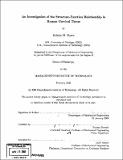| dc.contributor.advisor | Simona Socrate. | en_US |
| dc.contributor.author | Myers, Kristin M | en_US |
| dc.contributor.other | Massachusetts Institute of Technology. Dept. of Mechanical Engineering. | en_US |
| dc.date.accessioned | 2009-03-16T19:39:06Z | |
| dc.date.available | 2009-03-16T19:39:06Z | |
| dc.date.copyright | 2008 | en_US |
| dc.date.issued | 2008 | en_US |
| dc.identifier.uri | http://hdl.handle.net/1721.1/44755 | |
| dc.description | Thesis (Ph. D.)--Massachusetts Institute of Technology, Dept. of Mechanical Engineering, 2008. | en_US |
| dc.description | Includes bibliographical references (leaves 198-210). | en_US |
| dc.description.abstract | The cervix plays a crucial role in maintaining a healthy pregnancy, acting as a mechanical barrier to hold the fetus inside the uterus during gestation. Altered biochemical and mechanical properties of the cervical tissue are suspected to play an important role in spontaneous pre term birth. Slight changes in the biochemical properties are known to cause softening of the cervical tissue thus weakening the structure. Premature softening of the cervical tissue is associated with spontaneous pre term birth and the clinical condition known as cervical insufficiency. "Cervical insufficiency" is clinically defined as a history of spontaneous pre term birth associated with a painless contraction-free delivery. Diagnosing cervical insufficiency remains elusive in the medical community because the etiology of this disease is unknown. Therefore, there is a need to establish a better understanding of this disease to aid in the identification and management of patients. This doctoral study explores the relationship between the biochemical and mechanical properties of human cervical tissue. The structure-function relationship is investigated by measuring the stress-response of the tissue in various modes of deformation and assaying the tissue for biochemical content. To generate material properties which reflect the tissue's biochemical content, micro-structurally based constitutive relationships are fit to the experimental data from mechanical tests. Values of the constitutive model parameters corresponding to the best fit to the material response in all modes of deformation represent the "mechanical properties" of the sample. Mechanical properties and the structural properties of the collagen and proteoglycans of each sample are compared, and it was found that the mechanical and biochemical properties vary for women with different obstetric backgrounds. | en_US |
| dc.description.abstract | (cont.) Pregnant tissue is softer than non pregnant tissue, and non pregnant tissue from women with previous vaginal deliveries is softer than non-pregnant tissue from women with no previous vaginal deliveries. These changes in mechanical characteristics correspond to a shift in biochemical content with the softer tissue having a higher collagen solubility and an altered glycosaminoglycan content. An improved knowledge of the structure-function relationship is an important first step in understanding how the microstructure of the extracellular matrix (ECM) relates to its macroscopic mechanical response. In addition, the identification of key biochemical regulators of mechanical properties can constitute the basis for pharmacological intervention to correct pathological abnormalities in tissue response. | en_US |
| dc.description.statementofresponsibility | by Kristin M. Myers. | en_US |
| dc.format.extent | 210 leaves | en_US |
| dc.language.iso | eng | en_US |
| dc.publisher | Massachusetts Institute of Technology | en_US |
| dc.rights | M.I.T. theses are protected by
copyright. They may be viewed from this source for any purpose, but
reproduction or distribution in any format is prohibited without written
permission. See provided URL for inquiries about permission. | en_US |
| dc.rights.uri | http://dspace.mit.edu/handle/1721.1/7582 | en_US |
| dc.subject | Mechanical Engineering. | en_US |
| dc.title | An investigation of the structure-function relationship in human cervical tissue | en_US |
| dc.type | Thesis | en_US |
| dc.description.degree | Ph.D. | en_US |
| dc.contributor.department | Massachusetts Institute of Technology. Department of Mechanical Engineering | |
| dc.identifier.oclc | 298858652 | en_US |
